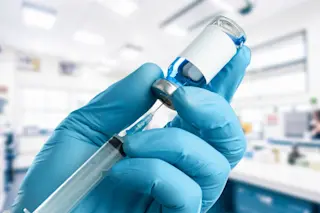In 2022, the Food and Drug Administration (FDA), along with other health organizations, approved the drug lenacapavir as a groundbreaking HIV/AIDS treatment. The FDA, as of June 18, 2025, has now approved the drug as an HIV preventive, or HIV pre-exposure prophylaxis (PrEP).
In a 2024 clinical trial, lenacapavir had a 100 percent success rate at preventing HIV transmission with only two injections per year.
“PrEP is one of the most indispensable tools we have for ending the HIV epidemic. Having the option of a twice-annual shot, rather than relying on a daily pill, will make long-term adherence to PrEP much easier for many,” said Kevin Robert Frost, the CEO of the American Foundation for AIDS Research (amfAR) in a press release. “But this remarkable drug will only be as effective as it is accessible and affordable. amfAR calls on Gilead Sciences and the U.S. Government to do everything in their power to make sure as many people who want lenacapavir can get it.”
This is an incredible medical breakthrough, but it could be hindered by high costs and government cutbacks.
Read More: Some Medications Used to Treat HIV May Prevent or Delay Alzheimer’s Onset
How Does Lenacapavir Work?
Lenacapavir, named Yeztugo by the drug’s manufacturer, Gilead Sciences, works by inhibiting the capsid — the protein shell — of the virus, disrupting the virus’s life cycle.
The drug will only need to be administered twice a year with a subcutaneous (under the skin) injection. The injections are typically administered in the abdomen.
According to Gilead Sciences, administering the drug this way is more effective and efficient than other treatments, such as the once-daily oral Truvada, which Gilead also manufactures. With fewer doses, this can also help lower stigma around the drug and HIV.
“Yeztugo could be the transformative PrEP option we’ve been waiting for — offering the potential to boost PrEP uptake and persistence and adding a powerful new tool in our mission to end the HIV epidemic,” said Carlos del Rio, distinguished professor of medicine in the Division of Infectious Diseases at Emory University School of Medicine and co-director of the Emory Center for AIDS Research in Atlanta, in a press release from Gilead Sciences.
“A twice-yearly injection could greatly address key barriers like adherence and stigma, which individuals on more frequent PrEP dosing regimens, especially daily oral PrEP, can face. We also know that, in research, many people who need or want PrEP preferred less frequent dosing,” del Rio added in the release.
Access to Treatment
While these medications could help save countless lives and prevent others from contracting the virus, there have been some issues accessing the drugs.
According to a study from The Lancet HIV, in the U.S., the states with greater access to oral PrEP saw a 38 percent decrease in new HIV cases over a 10-year period compared to a 27 percent increase in new HIV cases in states with low access to oral PrEP.
In 2022, of the 1.2 million people in the U.S. who could benefit from PrEP, only about 36 percent, or 400,000 people, were prescribed the treatment, according to a report from the Centers for Disease Control and Prevention (CDC). Recent cuts to public and foreign health agencies that could help distribute the drug may also cause delays in getting treatment to those who need it.
Another major concern is the drug's cost. According to a statement from AIDS Healthcare Foundation (AHF) President Michael Weinstein, Gilead Sciences could charge as much as $28,000 a year for the drug.
According to the press release from Gilead, the company will work alongside insurers to ensure that people can afford the medication and implement programs to help those without insurance in the U.S.
However, the accessibility of the drug to other countries remains unknown. More information is still to come.
This article is not offering medical advice and should be used for informational purposes only.
Read More: 9 of the Most Remarkable Scientific Discoveries of 2024
Article Sources
Our writers at Discovermagazine.com use peer-reviewed studies and high-quality sources for our articles, and our editors review for scientific accuracy and editorial standards. Review the sources used below for this article:















